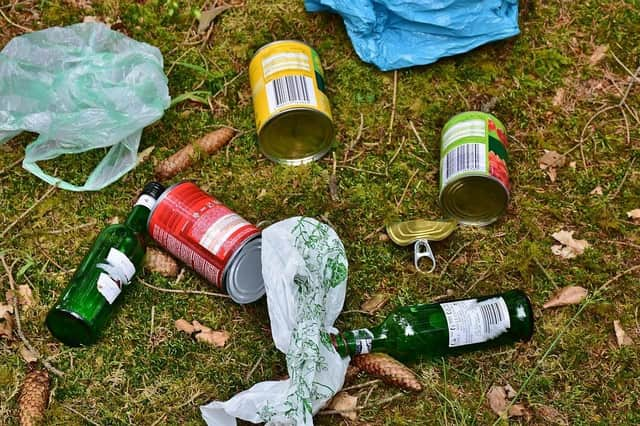Deprived communities impacted most by Scotland’s growing litter problem


The environmental charity has published ‘Time for a new approach: tackling the litter emergency’, an update report which outlines some damning stats from a major survey of streets and a public perception poll.
It calls for stakeholders to urgently collaborate and innovate to deliver positive and impactful campaigns, projects and interventions to reduce litter in our communities and reverse the litter emergency we have been warning of.
Key findings outlined in the report include:
Advertisement
Hide AdAdvertisement
Hide Ad- 87 per cent of respondents indicated that litter remains an issue of significant concern.
- Two-thirds of Scotland’s local authorities have seen an increase in the percentage of unacceptably littered sites this year.
- The gap between most and least deprived areas continues to widen and is the largest we have ever recorded with communities within most deprived areas experiencing a disproportionate increase in the number of significantly littered sites.
- 81 per cent of respondents in the most deprived fifth of neighbourhoods reported that they see litter ‘very’ or ‘somewhat’ often, compared to 68 per cent in the least deprived neighbourhoods.
Commenting on the situation, Barry Fisher, CEO of Keep Scotland Beautiful, said: “Litter is still being dropped.
"And, the same unsustainable consumption habits and throwaway culture fueling the twin climate and nature crises are also driving the litter emergency.
"With almost 90% of people asked believing that litter is significant issue of public concern and our technical data showing the largest gap we have ever recorded between litter levels in our most and least deprived communities, this is an issue we must invest in tackling. And now.”
Once again cigarette litter is the most common item, with it being recorded on 62.7% of all sites surveyed.
Advertisement
Hide AdAdvertisement
Hide AdBut this year the charity has again recorded the highest percentage of sites with fast food related litter in a decade.
With some of this waste being eligible for the Scottish Government’s Deposit Return Scheme (DRS), currently scheduled to be implemented next August, it provides some insight into the proportion of litter that could be reduced in future.
Mr Fisher added: “The decline in local environmental quality was first reported by us in 2016 across all parts of Scotland.
"Now it is damaging our communities and costing us a significant amount of money annually to address.
Advertisement
Hide AdAdvertisement
Hide Ad"A further delay to real action will only cost us more in the long run.
“We know that the public and key stakeholders want to see more done to reduce litter levels, and this was mirrored in the recent responses to the Scottish Government consultation on a new Litter and Flytipping Strategy for Scotland.
“While we recognise the challenging financial times we are in and welcome the positive progress made in terms of the development of the new strategy - now delayed until early 2023 - we have been clear that the strategy and supporting action plan must be properly resourced in order to be effective, have a positive impact and meet the expectations of communities and other stakeholders across Scotland.
“Despite the depressing evidence, we remain hopeful, and urge everyone to take crucial positive action.
Advertisement
Hide AdAdvertisement
Hide Ad"We all need to consider what we buy, throw away, and how we treat the places we live, work and visit.
"Only by changing our own behaviours can we keep Scotland beautiful.”
Tackling the litter problem in Scotland will also help us solve the global climate and nature crisis so we urge everyone to join us to make our country litter free: take part in a litter pick, sign up to Spring Clean, do your own survey or help us share the message that littering is unacceptable.